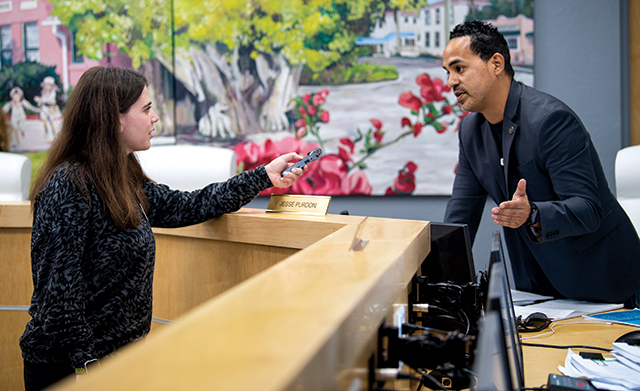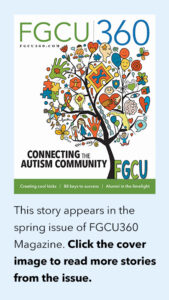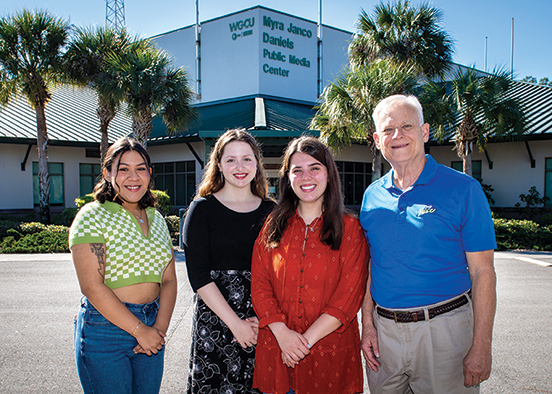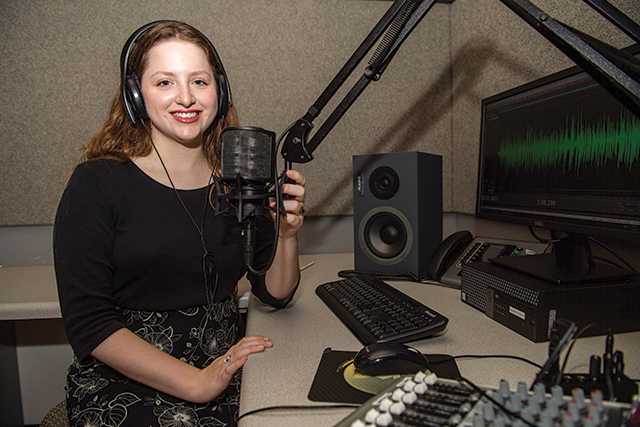The first time journalism student Samantha Roesler intended to cover a government meeting, she attended a city council meeting in Bonita Springs. She lives in Bonita, so that made sense.
“I had never even attended a meeting and didn’t bother looking through an agenda,” the senior says, and laughs about it now.

As one of three Democracy Watch fellows during the spring semester, Roesler learned quickly that homework was required. She was covering stories for WGCU and in uncharted territory. This wasn’t like interviewing students on campus for Eagle Media – of which she is executive editor. “Those seemed like practice stories to me,” she said recently, remembering.
She was surprised by some of what she saw. “There were disagreements in that meeting. I wondered, are they really supposed to be yelling at each other?”
 She realizes now that public comments can get fiery and she enjoys seeing the passion with which people engage with their elected officials. She knows how important a story’s background is – and that’s made an impression not only on WGCU but also the Bonita Banner, Marco Eagle and Estero Life magazine, for which she freelances now. “I feel like with every story I do I become a little micro-expert,” Roesler says. “That’s what I love about journalism.”
She realizes now that public comments can get fiery and she enjoys seeing the passion with which people engage with their elected officials. She knows how important a story’s background is – and that’s made an impression not only on WGCU but also the Bonita Banner, Marco Eagle and Estero Life magazine, for which she freelances now. “I feel like with every story I do I become a little micro-expert,” Roesler says. “That’s what I love about journalism.”
Fellow Sabrina Salovitz loves the politics. Her media experience began her freshman year in high school when she more or less fell into a TV production class because she simply needed another few credits. And then she grew throughout high school as an activist with March for Our Lives. “I spoke at a lot of events and got confident about speaking to older people,” she says.
But it can get rough out there, the senior acknowledges. She has been surprised by some people’s remarks. “People have accused me of recording them without permission. Or of spinning their quotes. At the end of the day I remember I’m a good journalist. I follow ethics. I’ve been corrected on things before. That’s life, it happens.

“People have very strong beliefs. That’s a beautiful part of politics that I love. I love when I can get a quote where someone is super-impassioned.”
That would include the Rev. Houston Cypress, a member of the Miccosukee Tribe who laments the degradation of the Everglades in a story Salovitz reported for NPR’s Next Gen radio. She was chosen for a week-long workshop held by NPR to train six students to cover climate change.
Journalism Professor Lyn Millner designed the Democracy Watch program, created a proposal – help with which she credits Clark Bell, former journalism program director for the Robert R. McCormick Foundation and “a good friend of the journalism program.” Millner worked with the FGCU Foundation to pitch the program (successfully) to Foundation donors Howard Cohen, Linda Penniman and Jim Hale, all of whom are current members of the WGCU Public Media Advisory Board.
Adjunct journalism instructor Mike Walcher, who was an anchor reporter for WINK-TV from 1998 to 2016, put together a syllabus and started teaching the Democracy Watch class last fall. Of the seven students that first semester, three were chosen to be paid fellows earning $10 an hour, or about $1,350 a semester.
“The Democracy Watch program is a great example of the synergy between FGCU and WGCU. It gives our students real-world experience, helps WGCU broaden its reach, and benefits the public by shining more light on the operation of our government,” says FGCU Vice President for Advancement Kitty Green.

“Through this collaboration, we hope to continue to bring strong stories to Southwest Florida’s residents and visitors for years to come. It’s also important (and a pleasure) for WGCU to help be a part of raising up a new generation of multimedia journalists,” says Pam James, Democracy Watch liaison and executive producer of content for WGCU.
Strengthening WGCU’s news coverage is one of the top goals expressed by General Manager Corey Lewis, in that post since May 2021. He believes public media is aptly positioned as a nonprofit, member-supported service to ensure that Southwest Floridians have relevant news and the context as commercial media delivers less.
It seems as if Democracy Watch already has nudged WGCU news a little further along that path. “Many of their stories are not showing up (elsewhere) in local media,” says Walcher. “I think that’s a good way to look at the success of what we’ve done so far. Really that was the goal, to fill in the huge gaps left by local media, which has had so many cutbacks.”
Diverse voices were not showing up in local media, either, the way Democracy Watch fellow Katiuska Carrillo thought they should be. Carrillo earned a bachelor’s in journalism from FGCU in December 2021 and was asked to stay on as a fellow for the spring term. “I didn’t have the opportunity to branch out and get involved the way I wanted to” at FGCU, Carrillo says. But the Democracy Watch experience has solidified in her mind what her career path should be. “I like representing underrepresented populations,” says Carrillo, who describes herself as Latina.
She covered a fair housing initiative in Immokalee and wrote an emotional and insightful story about a Hispanic family who lost their grandmother to COVID, and what put Hispanic families at risk.
“I definitely was intimidated at first,” says Carillo. “Sometimes it felt like I didn’t belong there, but as time went on, I realized what I was doing was important.”